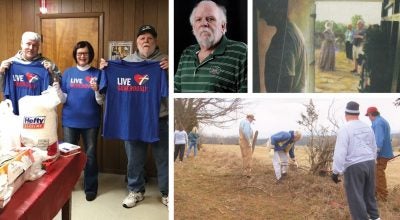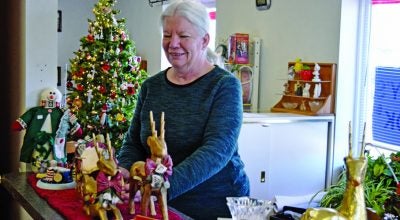Groups could be resource for food pantries
Published 10:11 am Friday, May 30, 2014
Extending the hours of the Downtown Churches Food Pantry seemed like the thing to do. But then reality set in. Too many families and not enough food.
In January of 2013 the pantry served 450 families. This January that figure went up exponentially.
“It is at least 4X or 5X,” Diane Porter, pantry director, said. “People out in the county learned they were eligible. We had people coming from Waterloo, Pedro, Franklin Furnace. It exploded July of last year.”
For a while the pantry had sufficient funding.
“Last year we started running short in November,” Porter said. “We had our yearly fundraiser and thought it would replenish, but it hasn’t.”
Now the pantry is only open twice a week and those getting food can only come every 60 days instead of once a month, as they had been.
Enter a group of women who were meeting at First Presbyterian Church catty-cornered from the pantry.
“We were just talking in general about the food pantry,” said Jan Williams, pastor of First Presbyterian and also vice president of Church Women United of Lawrence County.
CWU is a national interdenominational group that has on its radar such issues as stopping human trafficking and domestic violence.
“Lawrence County is part of a statewide group that is part of a national group,” Williams said.
Locally, CWU chapter reaches out to the city’s domestic violence shelter.
Now, the women’s organization wants to inspire others to be a resource for the food pantries in the county.
“The planning committee came up with a suggestion that is for anyone who attends meetings, faith-related or secular,” Williams said. “For every time there is a meeting that you are a part of, you bring a can of a commodity such as fruits or vegetables or spaghetti. Then designate someone from your group to take the accumulated cans to your nearest food pantry.”
If that takes off, it is welcome news not only for the Downtown Churches pantry, but others across the county.
“We are getting a cutback on food and it is hard for us to deal with,” Ken Vessely, a volunteer for the pantry at Church of Christ on 10th and Vine streets, said. “We are picking up people from other pantries. These people are survivors. Wherever they can go, they will go.”
That pantry that has been in existence for about 20 years is in the same situation as Downtown Churches, finding enough food for people in need.
“They have cut back on food stamps,” Vessely said. “There was one gentleman and they cut him back two-thirds. They are counting on that and boom it goes.”
The Chesapeake Community Center food pantry takes care of between 350 to 400 families a month or up to 1,000 people. It costs approximately $5,000 a month to cover its food costs.
“We try to give them the equivalent of a seven-day supply and that takes quite a bit of food,” Don Moore, director of the Chesapeake center, said. “We don’t try to pass up any food that becomes available.”
Williams looks at the idea of groups collecting food could turn into other ways to help those in need.
“There are a lot of folks, who, by no fault of their own, are harmed by this economy,” Williams said. “This is not some moral failing on their part. It is a temporary circumstance for us to deal with as generously and graciously as possible.”




